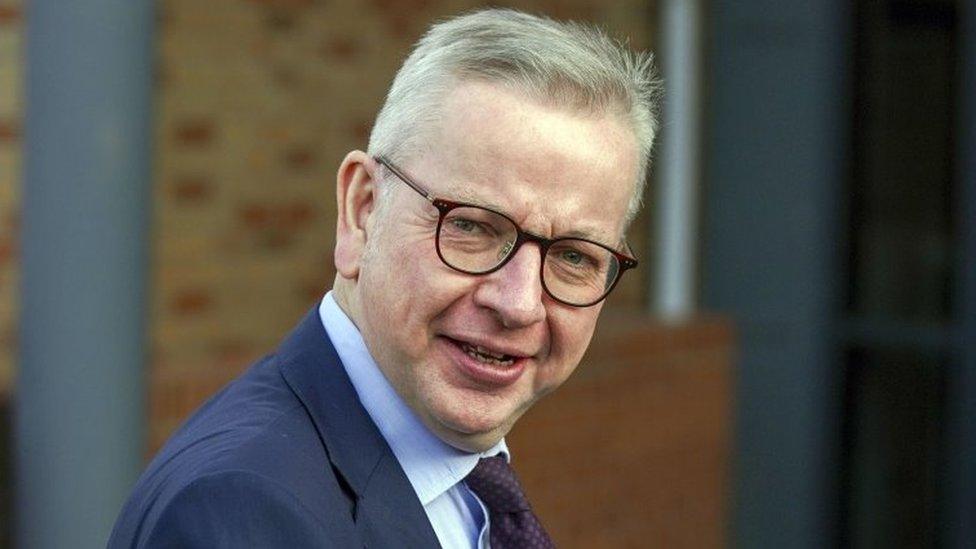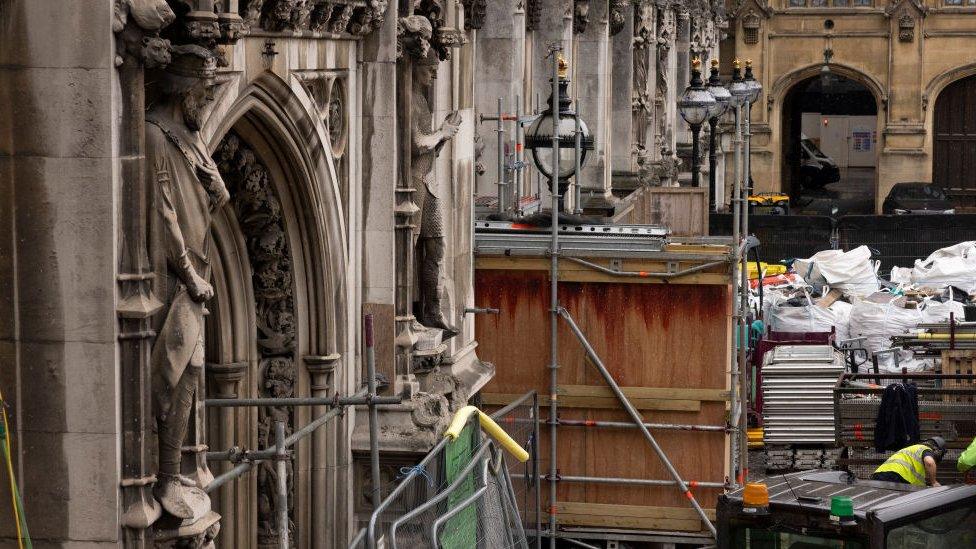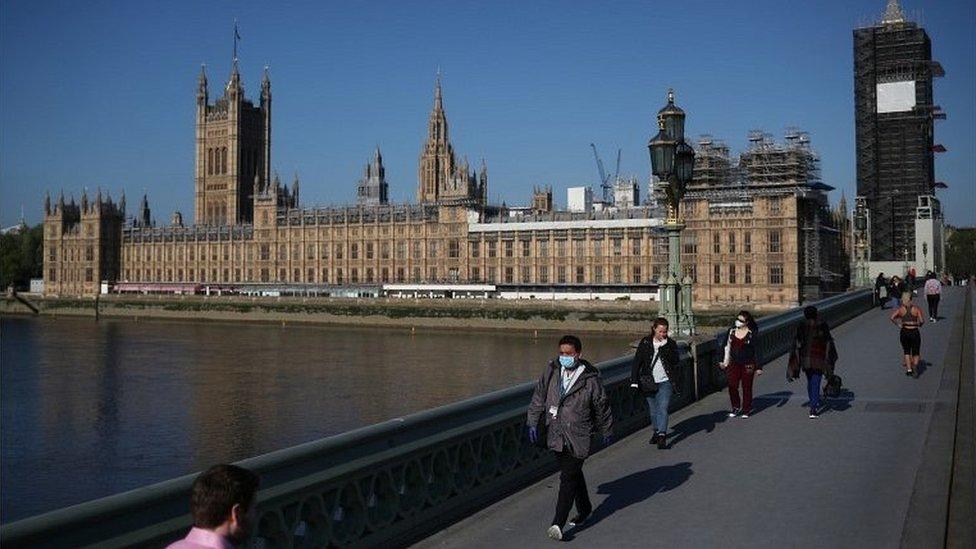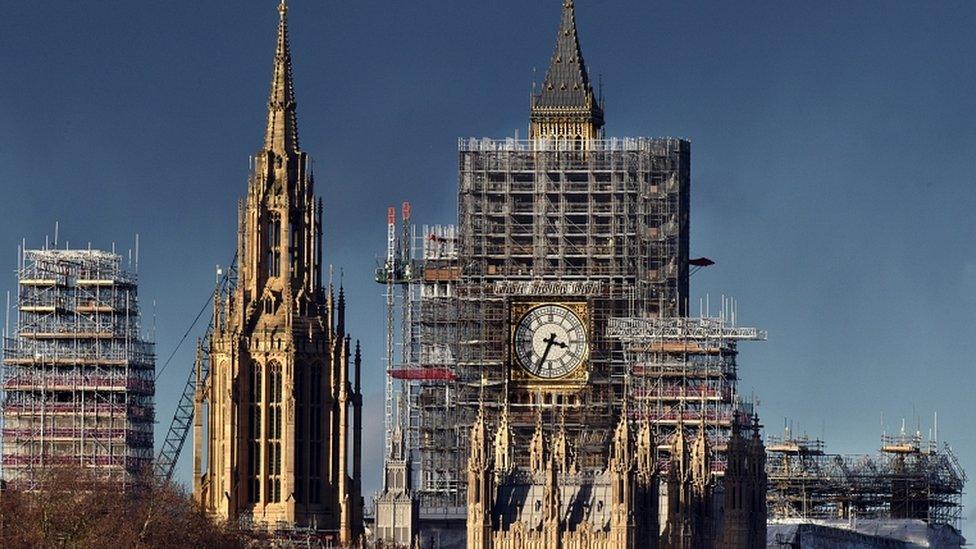Parliament must not be divided by relocation, peers argue
- Published
Peers criticise Michael Gove's suggestion that they should leave London during Parliament's restoration
Peers have criticised Levelling Up Secretary Michael Gove for proposing a temporary move out of London for the House of Lords.
Parliament's upper house could relocate while extensive renovation work on the Palace of Westminster is carried out.
Mr Gove has said he would welcome the idea, naming Stoke-on-Trent, Sunderland and Burnley as possible hosts.
But the Lord Speaker said separating Parliament's two houses geographically seemed "highly questionable".
In a letter to peers, Lord McFall said the Lords' law-making role was "indivisible" from that of the House of Commons, the lower chamber, where MPs sit.
"Whilst I agree with the secretary of state that politics can be too London-centric, I don't believe moving locations in and of itself would address these concerns," he wrote.
Peers gave Mr Gove's proposal a chilly reception during a discussion on the location of the Lords during Parliament's multi-billion pound restoration, which could take decades.
Lord Carlile, an independent, said locating the two Houses of Parliament in different places would be an "adverse and unconstitutional act".
"Can he remind Mr Gove that we are one Parliament, not two?" he asked Conservative minister Lord True, suggesting the Commons should be part of any relocation.

Michael Gove has suggested Stoke-on-Trent, Burnley and Sunderland as temporary homes for the Lords
In a letter to Lord McFall, first reported on by the Sunday Times and seen by the BBC, Mr Gove wrote: "It is clear to me that the House of Lords moving elsewhere, even for a temporary period, would be widely welcomed.
"I know cities and towns across the UK would be pleased to extend their hospitality to peers."
Speaking in the Commons on Monday, Mr Gove touted the "formidable" attractions of Stoke-on-Trent, where Prime Minister Boris Johnson held a cabinet meeting last week.
The government has raised the prospect of relocation before, first mooting the move in January 2020.
Taking "decision-making closer to the communities" is part of ministers' levelling-up agenda, which seeks to address regional inequalities.
But a spokesperson for the Lords said any decision on relocation "whether on a permanent or temporary basis, is ultimately a matter for the House itself".

The restoration of Parliament will cost billions of pounds
A parliamentary commission is expected to make proposals for the restoration programme later this year.
MPs have already voted to accept the principle of vacating the Commons during restoration work, but issues such as the rising projected cost have provoked a backlash.
In their debate on relocation, peers were mostly dismissive of the idea and critical of Mr Gove for raising it in the manner he did.
Conservative Lord Forsyth, whose question prompted the debate, said relocation was "a matter for this House, and not for the executive".
In one pointed intervention, Conservative Lord Cormack asked if Mr Gove had been given the authority to contact the Lord Speaker, questioning whether his comments had been "another freelance exercise by another intellectual flibbertigibbet".
Some peers argued it was impractical to separate the Lords from the Commons.
'Full decant'
However, others supported the move, including independent Lord Austin, who said: "I think there is a case for looking at whether Parliament's deliberations could take place elsewhere in the country."
The cost of restoring Parliament will go up considerably if MPs or peers stay put in the building.
Earlier this year, a report said work could take up to 76 years if MPs were not moved, with the price tag for repairs reaching £22bn.
The project's sponsor body and delivery authority said the cheapest option would involve a "full decant" of the Palace of Westminster for between 12 and 20 years, leading to the work costing between £7bn and £13bn.
This method would cut the restoration time to between 19 and 28 years.
Some peers wanted to use the Queen Elizabeth II Centre in Westminster - minutes away from Parliament - as an alternative venue during the restoration.
The Lords had begun working on plans for a relocation there.
But in his letter to the Lord Speaker, Mr Gove said he "cannot endorse" a plan for peers to "decamp to a temporary home a mere 200 yards from the Palace of Westminster".
- Published22 May 2020

- Published19 August 2020
